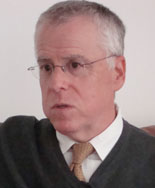
Tom Rosenstiel
Director, Project for Excellence in Journalism, Project for Excellence in Journalism
Washington, D.C.
[B7-E 0101]
Well, I think that many people have – the experience that when they first decided that they might want to be involved in journalism – and for me that was when I went to a black… I transferred to a high school that was 100 percent black the year before I went. And to desegregate the school they allowed students from all the communities to take the summer and invent the school from scratch. What would an ideal school look like if the students and faculty would start over and invent it just the way they want it? This was 1971.
And I was recruited that summer to work for the school newspaper by an upperclassman who, as it turns out, was Mike McCurry who was later Bill Clinton’s Press Secretary. They said well in this ideal school we’re going to let the students run this newspaper entirely, and we’ll encourage them and tutor them, but they won’t be supervised in the traditional sense. They’ll write it the way they want to write it.
And the school board was so up in arms over the freedom that we were given that they wanted to fire the woman who was the supervisor – teacher – of the student newspaper. And we ended up at school board meetings trying to defend essentially our editor or our publisher from being ousted by the board of directors, if you will, by the school board.
And I realized, as a friend of mine put it, that the lessons of this particular school were as much on the playground and the school board meetings as they were in the classroom. And I thought, well, the way to learn this lesson is to work for the school paper.
Then I went to college, and I went to a college that was the first integrated college in the country and founded by abolitionists, and I stumbled, my freshman year, into discovering, along with another student, a secret document from the Admissions Office that they wanted to now limit black enrollment at the college, which was pretty scandalous for this particular university – for this particular institution.
And when we published that, it went right to the foundations of the university, and I thought, “Gee, this newspaper stuff is pretty, pretty potent. It gets right to what people are thinking about and why they’re here and why they live here. This is – this is cool. You do this and people talk about why – who they want to be. Not too many things can do that.
So those are two examples that that occurred in my life when I was quite young before I knew I wanted to be a journalist, but they probably had some effect on my ending up where I did.


